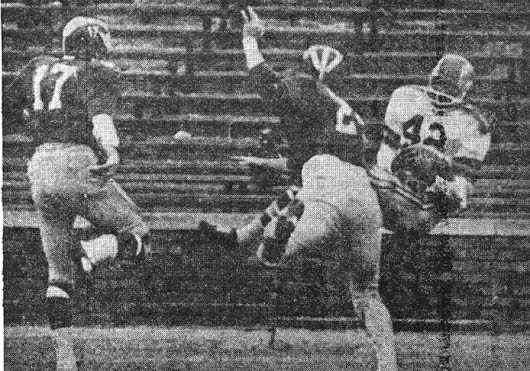
OSU running back Paul Warfield (42) catches a 35-yard pass from quarterback Don Unverferth late in the second quarter for a touchdown against Michigan Nov. 30, 1963. OSU won, 14-10.
Credit: AP wirephoto published by The Lantern Dec. 2, 1963
In a typical year for the Ohio State and Michigan football teams, there might not be anything that takes precedence above the rivals’ annual meeting at the end of the regular season. The Game took a backseat in 1963, however, to national tragedy.
Nov. 22, 1963, 50 years ago Friday, President John F. Kennedy was assassinated while traveling in a motorcade to an appearance in Dallas. The Ohio State-Michigan game, originally scheduled to be played the following day, was postponed one week — though not immediately.
“We were actually at the stadium getting dressed when it was canceled,” Arnie Chonko, a cornerback on the 1963 team, said in an interview with The Lantern. “They didn’t cancel the game until 10 in the morning.”
Members of that team acknowledged that had the game gone on as scheduled that Saturday, it would have been difficult to focus on football.
“It was just the demeanor of the team was like, this game isn’t really important,” linebacker Ike Kelley said. “It’s a big game and as far as the rivalry goes between the Buckeyes and the Wolverines, but at that particular moment when we heard the news, it really didn’t matter.”
Greg Lashutka, a tight end on the 1963 team who later became the mayor of Columbus from 1992 to 2000, said he thought postponing the game — as well as most of the other college football games scheduled around the nation that Nov. 23 — was the “smartest thing that collegiate football did.”
“I think that was the right thing to do so people could put themselves around their own reflection, get with their loved ones,” Lashutka said. “I don’t think we could have really played the game very well that next day if we had to. It was hard enough a week later, let alone the day after.”
The Game was rescheduled for Nov. 30, the latest a game between OSU and Michigan has been played until this year’s contest, which will also be played Nov. 30.
The postponement had a number of effects on the rescheduled game, which the Buckeyes won, 14-10.
The official attendance of that game at Michigan Stadium, which had hosted 101,450 people during a game against Michigan State earlier that year, was only 36,424, the lowest of any game at Michigan Stadium that season.
The cold, wintry weather that often characterizes late November also played a factor in the game.
“It was a really cold day and snowy,” Chonko said. “Not snow on the field, but sort of flurries.”
The day had a high of 41 degrees and a low of 27, according to Weather Underground.
The postponing had a tangible benefit for the Buckeyes, Kelley said, as it gave a number of injured players another week to heal.
“I’m not sure that we would have won that game if we would have played it the next day,” Kelley said.
In the aftermath of tragedy, however, Lashutka said the win was a “hollow victory.”
“You wanted to play the game, you wanted to win, but it clearly (took) a lot of the enthusiasm out of the classic Ohio State-Michigan rivalry,” Lashutka said. “We all played for the sake of the game and for self-respect, but I don’t believe anybody’s heart was 100 percent in it.”
Kelley said even eight days later, the normal thrill of a victory against Michigan was quickly replaced by the reality of what happened Nov. 22.
“Everybody was happy that we had won the game but then it was back to the, you know, how’s the country going to heal up after such a horrific incident taking place,” Kelley said.
During the game itself, however, Chonko said his focus was solely on OSU’s annual goal in the rivalry game: beat Michigan.
“Once you see those helmets, those Michigan Wolverines helmets, you immediately get refocused,” Chonko said. “There’s just something about those damn helmets that just irritate a Ohio boy.”
Unlike this year’s game, in which the Buckeyes (10-0) are set to play the Wolverines (7-3) with an eye on berths in the Big Ten Championship Game and in a BCS bowl, OSU’s 1963 season ended on that Nov. 30, as OSU fell short of qualifying for the Rose Bowl by finishing the year with a 5-3-1 record. Still, the OSU players said the win helped bring back some normalcy in what Chonko called a “time of great turmoil.”
“We enjoyed it ‘cause we won,” Chonko said. “It would have really looked bad if we would had lost.”
Nonetheless, all three players said they still vividly remember, 50 years later, how they felt when they heard about the assassination.
“You remember where you were specifically the moment you heard the news,” Kelley said.


